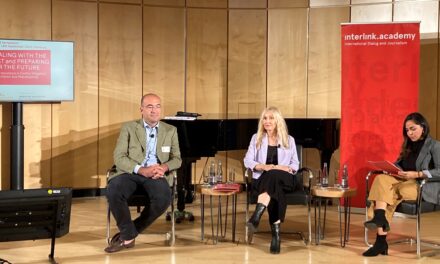Rule of Law to Ensure Safety of Journalists and Combating Impunity
The rule of law is a prerequisite for, as well as an outcome of, a successful development agenda. For the UN, the rule of law refers to: “a principle of governance in which all persons, institutions and entities, public and private, including the State itself, are accountable to laws that are publicly promulgated, equally enforced and independently adjudicated, and which are consistent with international human rights norms and standards.”
The report of the High-Level Panel on the post-2015 development agenda noted that “the rule of law, freedom of speech and the media, open political choice and active citizen participation, access to justice, non-discriminatory and accountable governments and public institutions help drive development and have their own intrinsic value. They are both means to an end and an end in themselves”.
The rule of law is fundamental to the stability and smooth functioning of society. Only when the rule of law is respected can citizens have confidence in democratic process over the long term and invest in the sustainable development of their society. The news media have a crucial function as the sector of society most able to promote vigilance towards the rule of law, especially through fostering investigative journalism, promoting the openness of court, legislative and administrative proceedings, access to officials and to public documents. The government has a key role here in protecting the independence and pluralism of the news media, especially during critical moments of these processes.
The rule of law is especially important in regard to protecting the right to freedom of expression for everyone. Security must be especially guaranteed for those UNESCO describes as “journalists, media workers, and social media producers who generate a significant amount of public-interest journalism”. When these persons suffer crimes committed on account of their use of freedom of expression, the authorities must react swiftly and the perpetrators must be brought to justice in accordance with proper judicial process.
Development is damaged when journalists (as well as citizen journalists), editors, publishers and online intermediaries alike are subjected to political or financial coercion and manipulation. Whistle-blowers as sources for journalists are also persecuted, even though corrupt practices they report on are by definition at odds with development. Journalists who investigate corruption often face severe reprisals as corrupt officials threaten their place of work, their families and their reputation. The greatest harm to development is the killings of journalists. More than 600 journalists have been killed in the last ten years. It is not possible to speak of good governance when some of the most visible members of society, those who are responsible for bringing information and news to the public, are being murdered on average at the rate of one each week.
A free, independent and pluralistic media environment, online and offline, must be one in which those doing journalism can work safely and independently without the fear of being threatened or even killed. Development needs to be an environment where attacks, intimidations, harassments, abductions, arbitrary imprisonments, threats and killings of journalists are rare exceptions and not the norm, and where any violations are properly dealt with under the rule of law. The UN Plan of Action on the Safety of Journalists and the Issue of Impunity is a relatively new factor on the international stage of high significance to the problems of journalism safety and impunity. The Plan was conceived in the UNESCO International Programme for Development of Communication (IPDC) Council meeting in 2010 and was later endorsed by the United Nations Chief Executives Board in April 2012. It has the specific goal of mobilizing the UN family of agencies as well as other stakeholders including governments, regional organisations, NGOs and media houses to collaborate in creating a safer environment for journalists.
There is enormous potential in the UN Plan of Action in bringing the full weight of the UN to bear on the challenges, and in being a point of reference for others who share the concern to turn the tide. Already we are seeing the various UN mechanisms moving in a direction that contributes to the progress of the UN Plan of Action. Fundamental to the Plan is the insight that the experiences in one country or region can be useful for others trying to improve the safety of journalists. Compilation and sharing of up-to-date information and best practices and conducting international missions and investigations into particular cases can be highly beneficial. However, much work is still needed to achieve an optimum level of information exchange and joint learning, and in adapting good practices to different regional and national contexts. World Press Freedom Day 2014 is an appropriate occasion to take stock of these issues.
Source: UNESCO


